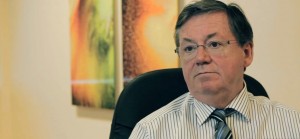View the Post on the Blog
View the Post on the BlogJoel (snowathlete) explains why he decided to consult Dr Kenny De Meirleir and describes his journey to De Meirleir's clinic in Belgium...

Prof Dr Kenny De Meirleir
I was diagnosed with Myalgic Encephalomyelitis/ Chronic Fatigue Syndrome (ME/CFS) in the summer of 2009 by an ME/CFS clinic run by the National Health Service. The UK is about as backwards as it gets when it comes to this illness of ours, so I was prescribed Graded Exercise Therapy (GET) by the NHS. It took me a long time to recover from the damage GET did to me, but once I was well enough, I started looking for better doctors and better treatments.
With so little nailed-down about the illness I decided it was important to see a doctor who had a lot of experience; someone who had seen a lot of different patients with the illness. I also wanted to see someone who would test for a wide range of problems, and prescribe treatment based upon the results.
There are not as many good ME/CFS doctors in the world as there should be, but there are some. In the UK there are few options. There are a couple of good doctors, such as Dr Sarah Myhill in Wales and Professor Julia Newton in Newcastle, but these two doctors are quite focused on specific areas, Mitochondria and the Autonomous Nervous System respectively. I think each of these areas have their merits, but as patients often suffer from multiple issues, it is a good idea to see a doctor who looks at a broad range of problems.
So, I started looking further afield. Traveling to the US was not completely out of the question, but it would have been extremely difficult for me to travel that far and certainly more expensive. In Europe there was De Meirleir’s clinic just north of Brussels and because of the Eurostar train from London to Brussels it was within fairly easy reach.
I contacted patients of his via the internet and heard good things. Indeed, most of the patients I spoke to had recovered somewhat and those that had not improved did not regret seeing him. De Meirler has worked on this illness for more than two decades and has seen thousands of patients. He was one of the authors of the Canadian and International Criteria. I also read a lot of his research papers, and watched a load of his videos on the net. I liked what I read, I liked what I saw.
Booking an appointment

Trying to find details of De Meirleir's clinic was not as easy as I thought it would be, but in the end a friend was able to point me to the clinic's website: Himmunitas.
The website was not what I expected. It is not flashy and it doesn’t contain a great deal of information, but it does show you where the clinic is located and provides contact details. So my lovely wife contacted the clinic on my behalf and inquired about seeing De Meirleir. We then went ahead and booked a two day visit to the clinic, Monday and Tuesday, to see De Meirleir and have investigative testing carried out. I didn’t need to get a referral from my GP. The waiting time was around two months - better than I expected. The clinic promptly emailed us some information explaining their standard procedure, and information on pricing.
Getting to the clinic
I quickly applied for a new passport. I haven’t left the country since I came down with ME/CFS and my old passport photo, taken when I was fifteen, no longer bore any resemblance to the sick looking man I am now (border control might have let me out, but I doubt they would have let me back in again). I then proceeded to book the travel. It's worth booking the Eurostar early when the ticket prices are quite reasonable. The earliest train on the Monday won’t get you to Belgium in time for your 8 am appointment, so you’ll need to travel up the day before. I then booked the train down to London, from Wiltshire where I live, and waited for the date to arrive.
Snow
In the week leading up to the trip it snowed. A lot. I began to wonder if the trip would have to be cancelled and I felt pretty worried about it. I checked the Eurostar website the day before and about half of the trains were cancelled. Fortunately, not mine, though there would be speed restrictions in place.
On the day, I caught the train to London’s Paddington station and despite the snow it started running on time. Then the train stopped. I looked out of the window and saw open fields. Something was wrong. The driver spoke over the intercom and explained that there was a defect on the rails ahead. My heart sank. Fortunately the driver decided to risk it, and going very slow he proceeded forward over the defective rails. You could feel the bumps as the carriage went over them but soon it was behind us, and cautiously, the driver opened up the throttle. We arrived in London ten minutes late. I had less than an hour to get to the Eurostar terminal at St Pancras. A friend from London told me not to bother with the underground but to get a taxi. Although a little more expensive, you get to sit down and it is a few minutes quicker. He was right – it was quick and easy. The ride cost £12.

Eurostar (Image curtesy of Arripay)
Eurostar
I made my way to the Eurostar terminal and went through passport control. It was tiring having to take my coat off and empty my pockets. I was starting to lag. I proceeded straight to boarding and had to walk from carriage three to carriage fifteen. It was a long way. Next time I will try to book a lower carriage number.
I found my reserved seat which was a table seat. Mistake. These seats have the least leg room and it really is significantly more cramped than the non-table seats. The train left on time and it really was quick under the sea; in no time at all, we came up into French daylight. We stopped at Lille and a few passengers got off. The doors shut. We did not move.
The train manager spoke over the intercom, and informed us that there was a fault and a technician had been called, and soon we would be informed if we could continue our journey, or not! But forty-five minutes later we were back underway. Phew!
The Eurostar terminates at Brussels Midi, which is the southernmost station in Brussels. De Meirleir’s clinic is near Vilvoorde to the north of Brussels. I made it to Vilvoorde and made my way carefully down the snow covered steps and out to the bus stop. Dark. Cold. Tired.
I scanned the timetable for Zondag (Sunday in Dutch) – no buses running to the hotel. Luckily everyone in Belgium speaks English and a girl at the bus stop offered to call me a taxi. After a half hour wait in the snow the taxi showed up and drove me to the hotel.
The Hotel
I stayed at the Euro Volley which is actually a sports centre. It's full of young, healthy, giant people with long legs and arms. I carried my small suitcase up the single flight of stairs and made it to my room. I checked the time on my phone. It was about 8 pm and I was supposed to fast from then until Monday afternoon. No chance, I was starving. The hotel cafeteria is closed on Sundays and the receptionist recommended a restaurant a five-minute walk away. I was already tired but I had to eat, so I wrapped up warm and started out.
The walk took fifteen minutes because of the snow and ice and I felt like an Arctic explorer who had run out of food. I forced myself to carry on until I reached De Drie Fonteinen (The Three Fountains) Brasserie. Good service. Good food. It was worth it. I struggled to make it back to the hotel afterward, but somehow I did. Straight to sleep.
I had booked the same taxi company that had picked me up from the station, to take me to the clinic at 7:30 on Monday morning. Big mistake. It didn’t turn up, but the staff at the hotel were helpful and sorted it out for me. The best thing about the hotel is that they will drive you to and from the clinic/station for a small charge, you just need to book it with them in advance at the front desk and in hindsight I should have relied on them instead of this other taxi company. I got to the clinic ten minutes late at 8:10 am.
What was the clinic like?

Himmunitas Clinic Interior
The clinic was larger than I expected. It was warm (which was good) and brightly lit with fluorescent lights. These might be a problem for some people with ME/CFS who are sensitive to bright lights, but fortunately I don't have that problem. The receptionist was friendly and welcoming. She handed me a two page questionnaire to fill in and directed me to a room where a nurse would start my lactose breath test.
The nurse welcomed me, explained the breath test and took the first reading. I then went to sit down and wait to see the man himself. Five minutes later I am called in. I shake his hand and sit down opposite his desk. I hand him a two page summary that I put together, highlighting my medical history, exposures, key problems. He reads it and asks a few questions: Do you smoke? No. Do you get pain in your jaw? Yes (and it clicks). Have you been bitten by a tick? Not that I know, but it’s certainly possible. Several more questions are asked and I can see he is listening carefully – he is thinking, diagnosing, predicting, deciding.
I ask a few questions of my own. He gives me straight answers. Soon, the appointment is over.
Now, this is not a consultation in the sense that most are used to, it is really about giving De Meirleir information so that he can start thinking about your case, decide what tests to run and so on. It is short, but I honestly don’t think there would be any point in it being any longer.
What is De Meirleir Like?
Now, let me tell you a bit about De Meirleir: he is not warm. Now don’t go jumping to conclusions. He is not cold; that’s not what I am saying. I believe he cares deeply about his patients, and I think people misunderstand why De Meirleir comes across as he does. He is professional and efficient and his manner is what it is in order that he can do his job properly.
Over the two days that I was in his clinic there were about twenty patients in the building and I wasn’t even there all day. We make a sorry looking bunch: sick, tired, desperate. Only about two people looked less ill than me and one patient spent the whole time in bed in the room next door on a drip.
De Meirleir doesn’t stop all day, he goes from one patient to the next, each patient walking in with this illness and their emotional baggage in hand, and we all want the same thing – we want him to make us better. But actually, secretly, we all want something else as well – we want him to listen to us, to hear how bad we have it and to acknowledge it. But actually he already knows. He is confronted with it all day long and if he allowed himself to engage too much on an emotional level he wouldn’t be able to do his job. It would be utterly soul destroying, and I still find it remarkable that he is able to do the job at all.
So, instead, he focuses on each person as a case. He takes it seriously, and looks at each person as an individual with different problems and different needs, but there is a barrier in place that lets him do his job. At one point when we briefly touched on something outside of ME/CFS, the man suddenly came alive in front of me; passionate and talkative. This was the real man before me, but as pleasant as the man is, I realised that he is not the man I need. The man I need is the clinician, the man who looks at me not with warmth, but with an analytical eye.
I should make another observation at this point: De Meirleir is a man committed to our disease. He could easily go and work on something more fulfilling, more self-serving. But he doesn’t. My understanding is that De Meirleir doesn’t even take a salary from his clinic, his only income coming from the University where he is a professor. It is hard to imagine how he finds time to conduct lectures, but somehow he does. Indeed, it is not just De Meirleir who works hard at the clinic. All his staff do. They don’t stop all day, going from one task to the next with great efficiency. The clinic runs like a well-oiled machine, working at full capacity at all times and with great professionalism.
After my appointment with De Meirleir I stayed to finish my lactose breath test (several tests half an hour apart) and the nurse provided me with a stool test kit and a pot to piss in (more than the UK government ever provided me with) and I returned to the hotel for a rest. The next day, the hotel driver dropped me off at the clinic and I began my fructose breath test. The nurse ran through the blood tests that De Meirleir proposed to run, which would go to three different blood labs. He provided me with a copy of the tests and asked me if I was happy with them all. He explained what they were all for and I signed off on them. I was pretty happy with the tests being run. Only one I thought was perhaps not worth running but I decided to go ahead with that one as well.
Blood
Then came the blood draw. I wasn’t looking forward to this; usually a phlebotomist will stab me a dozen times in frustration in an effort to find a vein and it’s quite an ordeal for us both. But not so this time. I hardly felt the needle go into my arm and he got it right first time. He took all the blood needed and it was over in no time. The guy knows what he is doing. What a relief.
Cost
It is expensive, but it is good value. The fee for seeing De Meirleir is €80. That’s nothing – my train to London cost more – and there is no charge for any of the other staff. The travel and hotel cost about £350 in total. The largest expense was the testing. It varies from one patient to another, but for me it will run to a little less than £2500. The same tests in the UK would have cost significantly more. The clinic bill you for the consultation and some of the tests on the day, and the rest are invoiced to you directly by the blood labs.
Obviously, this is a lot of money, but I see it as money well spent. This will confirm or rule out a great many viruses, bacteria, moulds and parasites and will also give me a status on my immune system. I think this is invaluable as these facts, personal to me, will tell me at least some of the problems that I have and knowing I have these problems, I can treat them. All in all, it has cost a little under £3000. I am grateful to my family for pulling together to cover the cost.
What next?
My results will take two months or more to get to me. A number of the tests need to be cultured and that takes time. Then I expect a further delay as De Meirleir will presumably take a look at them before they are sent to me. I will then review the results and have a further consultation with De Meirleir either in person or over the phone. At this point I will start treatment.
There are no guarantees with any of this, but even if it doesn’t work out for me, it’s hard to imagine I will regret it. I will have done everything I can to get better and I know I have seen one of the best ME/CFS doctors there is.
Joel was diagnosed with ME/CFS in 2009 but struggled with the illness for some time prior to this. He loves to write, and hopes to regain enough health to have his novels published.

